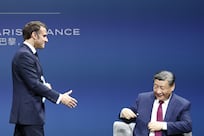In the pan-Arab daily Al Hayat, columnist Randa Takieddine posed the questions: "Who could ever be tasked with writing the achievements of Bashar Al Assad in Syria since he took the reins of the presidency and promised reforms and changes and modernisation?
“How would a hired historian write about Al Assad killing thousands of those he has described as ‘terrorists’ – even though most of them are children and women – about the four or five million displaced Syrians and about starving entire cities to death by embargo?”
The reality, she said, was that instead of fighting terrorism, Mr Al Assad had handed Syria over to the Russian and Iranian armies, Shiite militias and Hizbollah.
The true witnesses to the legacy of Mr Al Assad and his followers would be the displaced Syrian people and the humanitarian disaster that the world is witnessing as a result of their exodus.
The writer also noted the drownings of Syrian refugees trying to reach Europe and the deaths of others who were escaping bombs from the Syrian and Russian armies.
“Bashar Al Assad is currently regaining cities he had lost control over at a time when his war planes fought alone, bombing his people. But what is left of them?”
Takieddine noted that the Syrian regime remained “under the tutelage of Russia, Hizbollah and Iran”.
She added that US president Barack Obama’s disastrous policy in Syria, which has been described as “shameful” by American newspaper columnist Roger Cohen, had surrendered Syria to Russia.
Mr Obama “is far more interested in striking a deal with Russia than in the destiny of Syria”, Takieddine added.
“US secretary of state John Kerry is known for his naive optimism, as he believes that everything will be solved if everyone is persuaded to sit down at the negotiating table – despite the gunshots in the field, the starving and the bombing of Syrians with Russian shells.”
The writer said that former US president George W Bush had destroyed Iraq and let Iran enter it, while Mr Obama had gifted Syria to Russian president Vladimir Putin and Iraq to Iran. Iran had, in turn, taken over decision-making in Lebanon through Hizbollah.
Takieddine said that, in 2013, Mr Putin convinced Mr Obama that they should move together to prevent Mr Al Assad from using chemical weapons, but not bomb positions belonging to regime forces.
Mr Obama retreated, but now Mr Putin has intervened with his air force, keeping Mr Al Assad in power and using him as a “winning card” in his dealings with America and Europe.
“Despite the difficulties facing Russia’s economy, Mr Putin believes he will be able to bring hegemony back to the Middle East indefinitely, due to Mr Obama’s hesitation ... until a new US president is elected.”
She concluded that many observers were now wondering which US president was worse – Mr Bush or Mr Obama.
Writing in the pan-Arab daily Asharq Al Awsat, columnist Samir Atallah observed that "in the 1950s, a number of Arab states chose to befriend the Soviets, as the United States had taken a final decision to side with Israel. That choice may not have been ideal, but it was an available option."
The writer added that that decision, despite mutual good intentions, had only led to failure.
Now, many Arab states felt abandoned by the US under the Obama administration. They felt the situation was deteriorating and that it would be more appropriate to seek a new international balance, protecting Arab interests and buffering the impact of the Syrian conflict on the region.
Atallah observed that Arabs had once again discovered that in major crises, the US is an unreliable partner and that Russia’s friendship is equally undependable.
“One cannot reach a solution with Russia, nor without it, for an ideology based on the careless power of the fist cares for nothing,” the writer said.
“It is an ideology that leaves the wrestling to a colleague to win the ‘black belt’. Ask Chechnya.”
Translated by Carla Mirza
CMirza@thenational.ae





